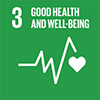Babies born during the earliest lockdown in 2020 had a very low rate of antibiotic use and reduced hospital admissions, according to a recent research study from RCSI University of Medicine and Health Sciences and Children’s Health Ireland (CHI).
Published in Paediatric Allergy and Immunology, the CORAL study found that immunisation among these infants was above the national average. It also found that the babies had very low rates of COVID-19 infection by six months of age, suggesting lockdown was an effective public health strategy in protecting one of society's most vulnerable groups.
The CORAL study is collecting blood and stool samples from 360 babies to investigate the impact of COVID-19 lockdown on their coronavirus exposure and routine healthcare access in Ireland.
The study seeks to determine if the lockdown might support what is known at the "hygiene hypothesis", which suggests that our very clean way of living increases allergy rates. Researchers will investigate how this this might be further exacerbated by lockdown and reduced human contact.
The children have since had allergy testing at one year of age, which will be repeated at two years of age. Researchers are currently examining the relationships between their microbiome and allergy outcomes.
The study's Principal Investigator is Professor Jonathan Hourihane from CHI at Temple Street and RCSI's Department of Paediatrics. It is a joint initiative with APC Centre in University College Cork, with babies recruited from the Rotunda and Coombe hospitals. It is co-funded by the Children’s Health Foundation and the Clemens von Pirquet Foundation, a European allergy charity.
RCSI is committed to achieving a better and more sustainable future through the UN Sustainable Development Goals.

